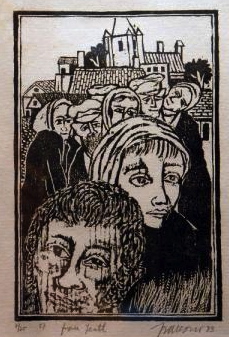Yosef, the Lost Yeshiva Boy

I've submitted an entry to Moment Magazine's Short Fiction Contest The story is entitled: "Yosef the Lost Yeshiva Boy"
You can read a brief excerpt here.
And below are a few notes on what inspired me to write it:
"Papa can you hear me?" That is the line I remember best from the movie Yentl, which I saw as a teenager. Barbara Striesand belts out these words with such pathos, looking up to the stars, desperately trying to connect with her deceased father. She attempts to remain close to his memory through the study of Talmud. In pre-war Eastern Europe, she can only do so by donning her father's clothes and going out into the world as a boy.
I empathized with Yentl's plight. As a teen, I too longed for a close connection to my father, and religion was one vehicle to attain that. The only problem - I could not sit next to him in the Orthodox synagogue where he prayed, or learn to chant Torah from him. In some ways, Yentl's painful tears were my own.
Much more recently, I read Yentl (a short story by Isaac Bashevis Singer) with my students while teaching "Gender and Judaism" at Boston University. I was struck by the way in IB Singer valorizes the study of Talmud, alongside other masculine sphere's of religious activity. By contrast, the women in his story, are silly or dirty, ditzy or ugly, and their activities are lowly and frivolous. No wonder Yentl longed to be a man!
But what if the world IB Singer depicted was rewritten? What if it was a world where women were sharp-witted and skilled, and their activities were refined and noble? In this reality, what if a boy lost his mother and cried out, "Mama, can you hear me?"
Longing to remain close to her memory, and completely disinterested in the Talmud, this boy disguises himself as a girl, and goes out into the world to practice all the noble skills his mother taught him. This is the premise of my story, "Yosef the Lost Yeshiva Boy." To read a brief excerpt click here.
You can read a brief excerpt here.
And below are a few notes on what inspired me to write it:
"Papa can you hear me?" That is the line I remember best from the movie Yentl, which I saw as a teenager. Barbara Striesand belts out these words with such pathos, looking up to the stars, desperately trying to connect with her deceased father. She attempts to remain close to his memory through the study of Talmud. In pre-war Eastern Europe, she can only do so by donning her father's clothes and going out into the world as a boy.
I empathized with Yentl's plight. As a teen, I too longed for a close connection to my father, and religion was one vehicle to attain that. The only problem - I could not sit next to him in the Orthodox synagogue where he prayed, or learn to chant Torah from him. In some ways, Yentl's painful tears were my own.
Much more recently, I read Yentl (a short story by Isaac Bashevis Singer) with my students while teaching "Gender and Judaism" at Boston University. I was struck by the way in IB Singer valorizes the study of Talmud, alongside other masculine sphere's of religious activity. By contrast, the women in his story, are silly or dirty, ditzy or ugly, and their activities are lowly and frivolous. No wonder Yentl longed to be a man!
But what if the world IB Singer depicted was rewritten? What if it was a world where women were sharp-witted and skilled, and their activities were refined and noble? In this reality, what if a boy lost his mother and cried out, "Mama, can you hear me?"
Longing to remain close to her memory, and completely disinterested in the Talmud, this boy disguises himself as a girl, and goes out into the world to practice all the noble skills his mother taught him. This is the premise of my story, "Yosef the Lost Yeshiva Boy." To read a brief excerpt click here.
